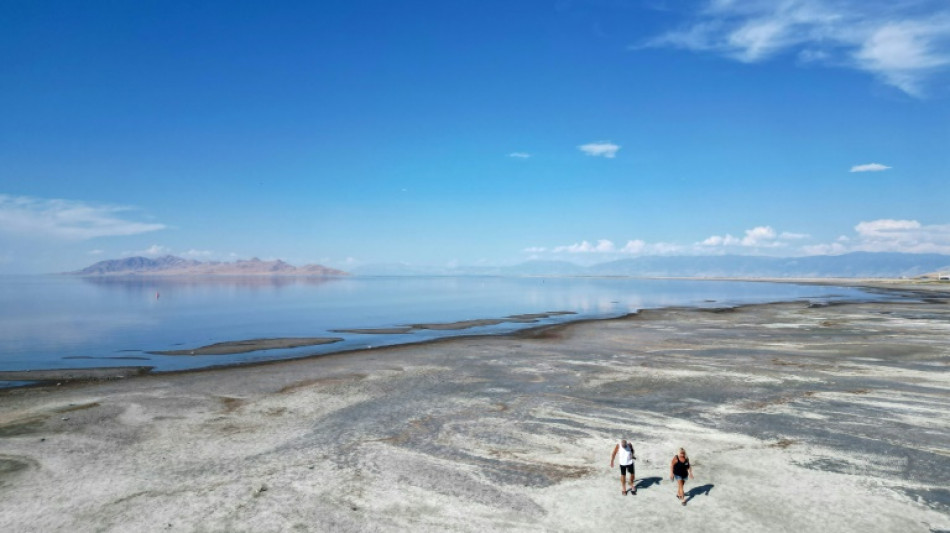From his ranch on the shores of the Great Salt Lake, Joel Ferry has a front row view of climate change: a native of Utah, the Republican farmer has seen the water's surface area shrink by two-thirds in the past 40 years.
And as director of the western US state's natural resources department, he knows that the drying up of the lake is an "environmental nuclear bomb," threatening the existence of Salt Lake City and the homes of two million people living on its shores.
Still, he will vote without hesitation for Donald Trump this November, despite the Republican presidential candidate's outspoken skepticism on climate change.
Ferry praises the former president's "good economic results," and as a Mormon says he is grateful because Trump has "been very strong on family value issues," including packing the US Supreme Court with conservative judges who overturned abortion rights.
For Ferry, these factors outweigh the fact that Trump regularly mocks claims of a climate emergency.
Just this summer, Trump claimed sea levels would rise "one-eighth of an inch over the next 400 years" and create "more oceanfront property."
"I think he's just teasing a little bit, I don't think he truly believes that," said Ferry.
This is a common response in Utah, where Mormons -- who represent half the state's population -- remain largely loyal to the Republican Party, despite reservations about Trump's personality.
No Democrat has won a presidential election in Utah since 1964.
- 'Mad Max' -
The region received a stark reminder of its ecological fragility in 2022.
That year, the Great Salt Lake plummeted to its lowest recorded levels, due to a combination of overconsumption of water by farming and mining sectors, and a historic drought spanning two decades.
The water became so salty that brine shrimp, a major source of income for the local economy, began to die. Migratory birds vanished because the flies they feed on were gone.
"It really triggered a lot of scientists, but a lot of just general worry that the lake was going to completely dry up," said David Parrott, deputy director of the Great Salt Lake Institute at Utah's Westminster University.
If the lake disappears, "it would be like 'Mad Max,' where water is completely gone and we just have to abandon the city," said the biologist, referring to the dystopian Hollywood movie franchise.
"It would be unthinkable."
This is because the lake bed, which contains arsenic and toxic heavy metals, would become more exposed to the open air, and contaminate the atmosphere during dust storms.
Ferry said the looming threat sparked a "rallying cry" among local Republicans.
Financial incentives for farmers to reduce water consumption; exploring technology that optimizes irrigation, and seeds clouds to increase rainfall; splitting the lake into two to limit its salinity: "over a billion dollars" has been invested in the past three years, he said.
Even the Mormon Church has set an example, substantially cutting its water use.
Utah is "a great example where you have a very red and conservative state making decisions that are very environmentally driven," said Ferry.
Nationally, "the environment should be a key priority of the Republicans as well."
- 'Local problem' -
Trump's environmental policies, which include rolling back President Joe Biden's climate legacy, are a world away from this ambition.
If he wins in November, it would likely end any hope of limiting global warming below 1.5 degrees Celsius (35 degrees Fahrenheit), according to climate science and policy website Carbon Brief.
Trump has pledged to once again withdraw the US from the landmark Paris climate agreement, which limits greenhouse gas emissions.
He has also repeatedly promised to "drill, baby, drill" for oil.
"A Donald Trump presidency would be disastrous for the environment in general and generally for Great Salt Lake," said Parrott.
He applauded local Republicans for doing "a Herculean job," but warned that every fractional increase in global temparatures will require more and more unpopular measures to be adopted, from increasing the price of water to banning lawn sprinklers.
In Salt Lake City, most conservative voters who spoke to AFP expressed concern about the health of the lake.
But many, like 75-year-old Bill Clements, said politicians in Washington should stop "telling us what to do" about this "local issue."
He is encouraged by the two abnormally rainy winters just passed, which have allowed the lake to rise a little -- though still below the minimum levels necessary for its preservation
"I also believe a lot of these things are natural... it goes down, up and down," said the retiree.
"I haven't joined the religion of climate change yet."
B.Chakrabarti--BD
